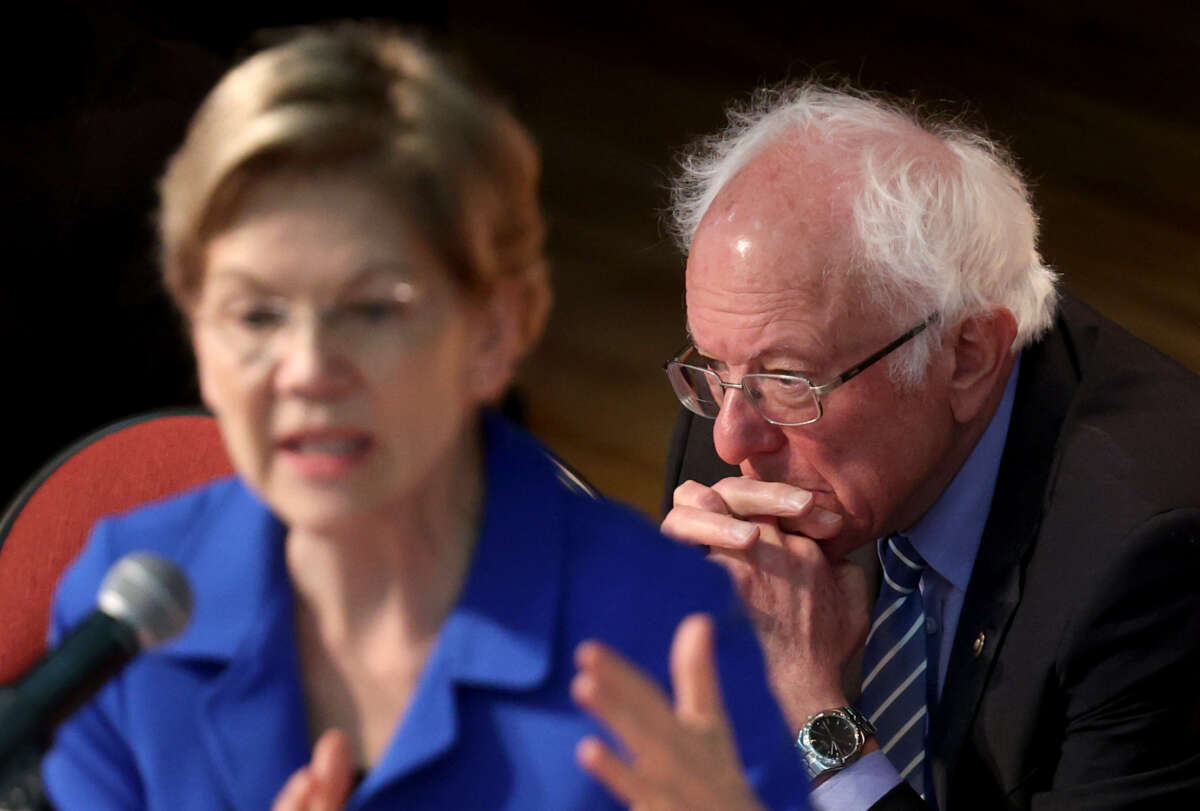Senators Bernie Sanders (I-Vermont) and Elizabeth Warren (D-Massachusetts) are demanding that Kroger, the U.S.’s largest supermarket brand, address reports of and lawsuits over “systemic and widespread errors” in the company’s payroll system that labor advocates say have opened the door for the company to commit wage theft.
The lawmakers say that Kroger’s latest failure to pay workers is part of a pattern for the company and adds further evidence to their argument that the company’s planned merger with Albertson’s, also one of the U.S.’s largest grocery chains, should be stopped by antitrust regulators.
“We are writing today regarding alarming new reports of Kroger’s involvement in the mistreatment of workers and consumers through widespread and unresolved wage theft,” the lawmakers wrote.
“Given your company’s record of anti-worker policies, and your ongoing attempt to push through a merger that would harm both consumers and workers, we are writing to request a full explanation of how your workers will be compensated for any lost or delayed wages, and how you will prevent future wage theft,” the letter continues. The letter was also signed by Sen. Ron Wyden (D-Oregon).
Last year, Kroger installed a new payroll system that has left thousands of workers with missing, late or incomplete paychecks. Some workers, many of whom are already living paycheck to paycheck, have said that they have worked weeks or over a month without getting a single paycheck.
This has had crushing effects on workers, who have reported being late on rent and bill payments, overdrawing their bank accounts and taking out predatory payday loans, which already target the most vulnerable Americans.
Workers and unions have filed four separate class action lawsuits against the company, alleging that workers are owed millions of dollars in damages.
“This is wage theft, plain and simple,” said United Food and Commercial Workers (UFCW) Local 400 President Mark Federici in a statement about one of the lawsuits in the mid-Atlantic region filed last month.
Workers have already been struggling with low wages at Kroger and its many affiliates.
According to a 2022 survey of over 10,000 workers in California, Colorado and Washington by Economic Roundtable, 63 percent of workers reported not being paid enough wages to afford basic monthly expenses, about 75 percent of workers said they were experiencing food insecurity, and 14 percent said they were currently experiencing or had recently experienced homelessness. According to research done by the Economic Policy Institute and the Shift Project in 2021, nearly half of Kroger workers make less than $15 an hour.
While workers have struggled to survive, Kroger and its executives have made off handsomely, especially with inflation-related profits over the past years. Kroger has experienced record growth in recent years, making billions in profits.
Meanwhile, Kroger’s CEO Rodney McMullen received $22 million in compensation in 2020 — even as the store was shutting down locations where local governments were mandating that workers get mere dollars more per hour in pandemic hazard pay.
Wage theft is extremely common. The amount of money that employers are estimated to steal each year far outpaces the amount of money stolen in petty thefts and burglaries that typically make headlines and become talking points among conservative politicians; EPI estimated in 2014 that wage theft costs Americans as much as $50 billion a year, and yet, this form of theft is rarely reported and workers are rarely compensated.
Our most important fundraising appeal of the year
December is the most critical time of year for Truthout, because our nonprofit news is funded almost entirely by individual donations from readers like you. So before you navigate away, we ask that you take just a second to support Truthout with a tax-deductible donation.
This year is a little different. We are up against a far-reaching, wide-scale attack on press freedom coming from the Trump administration. 2025 was a year of frightening censorship, news industry corporate consolidation, and worsening financial conditions for progressive nonprofits across the board.
We can only resist Trump’s agenda by cultivating a strong base of support. The right-wing mediasphere is funded comfortably by billionaire owners and venture capitalist philanthropists. At Truthout, we have you.
We’ve set an ambitious target for our year-end campaign — a goal of $230,000 to keep up our fight against authoritarianism in 2026. Please take a meaningful action in this fight: make a one-time or monthly donation to Truthout before December 31. If you have the means, please dig deep.
